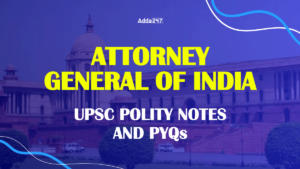Table of Contents
Finance Commissions plays a crucial role in the fiscal federalism of India by making recommendations on vertical devolution, horizontal distribution, and grants-in-aid between the Union and state governments. These recommendations are expected to bring about meaningful reforms and address pressing issues.
However, over the years, it has been observed that many of these normative and prescriptive recommendations have remained on paper, failing to translate into concrete action. This article explores the reasons behind this phenomenon and sheds light on the challenges faced in implementing the recommendations of the Finance Commission of India.
Finance Commission
A constitutionally mandated agency called the Finance Commission is in charge of dividing up certain revenue sources in India between the Union and State Governments. It was established in 1951 by the Indian President in accordance with Article 280 of the Indian Constitution. The Finance Commission’s main goal is to specify the financial relationships and funding allocations between the Central and State Governments.
Finance Commission of India
The Indian Constitution is one of the world’s longest written constitutions. The Finance Commission of India has a crucial role within the context of one of its parts, which focuses on Constitutional Bodies. This constitutional body is tasked with making recommendations regarding how money should be split between the Union and State Governments. It is established by The President once every five years.
The 15th Finance Commission, led by NK Singh, is now in effect from 2021 to 2026. The laws and duties of the Finance Commission are described in detail in Articles 280 and 281 of Part XII, Chapter I (Finance) of the Indian Constitution.
Finance Commission Detailed Reports
Finance Commissions submit comprehensive reports that contain numerous recommendations and proposals. The sheer volume of these reports, often spanning multiple volumes, can be overwhelming for policymakers and administrators. Consequently, many of the recommendations tend to get lost or overlooked in the bureaucratic machinery, reducing their impact on policy formulation and implementation.
Finance Commission Composition
We will first learn about the composition of the finance commission then further we will study about the functions performed by the finance commission
- Finance commission consist of chairman and 4 other members appointed by the President.
- They hold office for the period specified by the president.
- They are eligible to re appointment
- Constitution empowers the parliament to set qualifications for the members and the manner of their work.
- The chairman must have experience in public affairs.
- The other 4 members selected are to be from the mentioned below:
- Judge from High Court or one qualified to be one.
- A person who has specialized knowledge of finance and government accounts
- A person with experience in administration along with the financial knowledge
- A person with special knowledge of economics.
Finance Commission Functions
On the following matters, the Finance Commission advises the President of India:
| Functions of the Finance Commission | Explanation |
|---|---|
| Net tax proceeds distribution between the Centre and states | Recommends the division of tax revenue between the central and state governments, and allocates the same among the states. |
| Principles governing grants-in-aid to states | Formulates principles for providing financial assistance to states from the Consolidated Fund of India. |
| Extending consolidated fund of a state for local bodies | Suggests measures to augment the resources of Panchayats and Municipalities based on the state Finance Commission’s input. |
| Recommendations on matters referred by the president | Provides advice on any issue referred to it by the President in the interest of maintaining sound finance. |
| Deciding the basis for sharing divisible taxes and grants-in-aid every five years | Determines the criteria for sharing divisible taxes between the Centre and states and principles for grants-in-aid. |
| Exercising sufficient powers within its activity domain | Empowered to carry out its functions effectively and independently. |
| Possessing powers of a Civil Court | Has the authority to summon witnesses, request the production of documents, and conduct investigations akin to a Civil Court. |
Challenges of the Finance Commission of India
Challenges faced by the Finance Commission of India are ensuring the effective implementation of its recommendations and striking a balance between the fiscal needs of the central and state governments. Below you can check the details overview of the Challenges of the Finance Commission of India.
Ignoring Homilies and Pious Intentions
Finance Commissions frequently propose reforms at both the Union and state levels, including performance-based grants. Unfortunately, these well-intentioned suggestions are often disregarded or treated merely as pious intentions without the necessary follow-through. The focus remains primarily on the availability of resources rather than the comprehensive implementation of recommended reforms.
Conditionalities and Sectoral Focus
One of the reasons for the limited implementation of Finance Commission recommendations is the presence of conditionalities attached to grants-in-aid. Some states have raised objections to these conditionalities, as they restrict the flexibility of expenditure options. This leads to a partial implementation of grants, undermining the intended impact of these funds. Additionally, when recommendations focus on specific sectors, the overall impact on the broader economy may be diminished.
Unrealized Expectations and Rhetorical Promises
Finance Commissions have, at times, set high expectations with their recommendations, envisioning significant transformations in various sectors. However, reality often falls short of these grand visions. For instance, the 13th Finance Commission proposed initiatives to address the pending cases in the judicial system and improve the statistical system. Despite the allocation of funds and the formulation of action plans, the actual implementation of these reforms has been far from satisfactory.
Challenges in Statistical Framework and Data Availability
Finance Commissions rely on accurate and comprehensive data to make informed recommendations. However, there are challenges in obtaining reliable data across various sectors and states. The absence of quantifiable measures and unit costs for services, as well as gaps in inter-regional trade data, hinder the accurate assessment of cost disabilities and equitable distribution. Consequently, the lack of robust statistical frameworks limits the effectiveness of Finance Commission recommendations.
Role of Finance Commission :
Aspirants should note that recommendations made by the finance commission are only Advisory in nature and are not binding on the government.
Because nowhere, in the constitution it is mentioned that the recommendations are to be implemented and will be binding on government of India.
This has been a matter of criticism for the finance commission as it is a constitutional body the recommendation should not be struck down and also there has been a criticism for the planning commission, as it overlaps with the functions and responsibilities of the finance commission.
Areas on which the 16th Finance Commission should concentrate
Horizontal distribution:
- The 16th Finance Commission should focus on ensuring a fair horizontal distribution of resources among states.
- It should address the challenge of balancing the compensation from richer states to poorer states without deepening the divide, particularly between North and South states.
Restraining levying of cess and surcharges:
- The Commission should emphasize the need to restrain the imposition of cess and surcharges as a means to increase revenue.
- It should establish conditions for their imposition and develop a mechanism to cap the amount that can be raised through these measures.
Restraint on freebies
- The 16th Finance Commission should address the issue of excessive and unsustainable populist spending by governments.
- Despite the Fiscal Responsibility and Budget Management (FRBM) Act, governments have found ways to increase debt without proper accountability.
- The Commission should provide guidelines and restraints on spending to ensure long-term fiscal sustainability.
List of Finance Commission Chairman
In this part, you can check the List of Finance Commission Chairman.
| List of Finance Commission Chairman | ||
|---|---|---|
| Finance Commissions | Chairman | Establishment Year |
| 1st Finance Commission | K.C. Neogy | 1951 |
| 2nd Finance Commission | K. Santhanam | 1956 |
| 3rd Finance Commission | A.K. Chanda | 1960 |
| 4th Finance Commission | Dr. P.V. Rajamannar | 1964 |
| 5th Finance Commission | Mahavir Tyagi | 1968 |
| 6th Finance Commission | Brahamananda Reddy | 1972 |
| 7th Finance Commission | J.M. Shelat | 1977 |
| 8th Finance Commission | Y.B. Chavan | 1982 |
| 9th Finance Commission | N.K.P. Salve | 1987 |
| 10th Finance Commission | K.C. Pant | 1992 |
| 11th Finance Commission | A.M. Khusro | 1998 |
| 12th Finance Commission | Dr. C. Rangarajan | 2002 |
| 13th Finance Commission | Dr. Vijay Kelkar | 2007 |
| 14th Finance Commission | Y.V. Reddy | 2013 |
| 15th Finance Commission | N.K Singh | 2017 |
UPSC Prelims PYQs for Finance Commission
Q1.Consider the following:
- Demographic performance
- Forest and ecology
- Governance reforms
- Stable government
- Tax and fiscal efforts
For the horizontal tax devolution, the Fifteenth Finance Commission used how many of the above as criteria other than population area and income distance?(2023)
(a) Only two
(b) Only three
(c) Only four
(d) All five
Correct Answer: b
UPSC Mains PYQs for Finance Commission
- How is the Finance Commission of India constructed? What do you know about the terms of reference of the recently constituted Finance Commission? Discuss. (2018, 15 Marks)
- What is a Finance Commission? Discuss the main functions of the State Finance Commission. (2004, 15 Marks)
Finance Commission UPSC
For aspirants preparing for the UPSC examination, understanding the importance of Finance Commissions and their impact on fiscal policies is crucial. It is essential to grasp the complexities of resource distribution and the significance of effective implementation to contribute to the nation’s progress and welfare.
While Finance Commissions serve as important institutions in shaping fiscal policies and ensuring a fair distribution of resources, the gap between normative recommendations and actual implementation remains a persistent challenge. Overcoming this gap requires a concerted effort from policymakers, administrators, and all stakeholders involved.
It is crucial to move beyond rhetoric and focus on the comprehensive and timely implementation of Finance Commission recommendations to address the pressing issues faced by our nation. Only then can we realize the true potential of fiscal federalism and ensure inclusive development across all states and sectors.



 Attorney General of India UPSC Notes (Ar...
Attorney General of India UPSC Notes (Ar...
 Election Laws in India UPSC Notes
Election Laws in India UPSC Notes
 Indian Parliamentary Forums UPSC Notes
Indian Parliamentary Forums UPSC Notes




